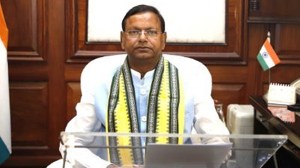Cheques amp; Balances
Demat: heads you lose and tails you loseThe Securities and Exchange Board of India's SEBI decision to introduce compulsory dematerialis...

Demat: heads you lose and tails you lose
The Securities and Exchange Board of India8217;s SEBI decision to introduce compulsory dematerialised trading in a designated list of companies is turning into a nightmare for smaller investors. The SEBI order, which was aimed at giving a fillip to the dematerialisation process, forced all investors to open accounts with a 100 odd depository participants DP registered with the National Securities Depository Ltd NSDL and to dematerialise their shares.
The SEBI compulsion, created an attractive business opportunity for banks and several of them registered themselves as DPs and used their branch network to attract new accounts. Soon after, private sector banks began to force investors to open a savings account along with their DP accounts and maintain a minimum balance. They argued that investors tend to vanish without paying their fees and the savings balance is a safeguard; nobody bothered to explain why the minimum balances, which ranged from Rs 3,000 toRs 10,000 and were disproportionate to any fee they would require to collect from investors.
When investors began to protest against this and against compulsory dematerialisation, SEBI came to their rescue and directed banks to stop forcing investors to open savings accounts. Even today, several banks continue to flout SEBI8217;s directive and investors who want the security of bank DP have no choice but to comply. SEBI says that it is conducting an investigation.
The next problem was the long delay in having the share dematerialised. The number of registered DPs was small and registrars were loaded with huge volumes, particularly during the book closure period a few months ago. There were cases when dematerialisation took more than two months and there are specific instances of registrars sending back shares on the grounds of signature mismatches even after they had been attested by banks. Again, SEBI and the NSDL were more sympathetic to the registrars and DPs. They said that the delays were caused byone-time pressure to go scripless; complaints about shares being returned were dismissed because they felt that it was better for registrars to be careful rather than rush through dematerialisation. In the process, genuine investors often suffered. It must also be mentioned that the investors8217; case was prejudiced by some complainants who were more upset that the transparency forced by the demat process would flush out their benami holdings and close the channel for their black money investment.
Now there is a bigger problem. Taking a cue from banks, broker DPs have also begun to collect deposits ranging from Rs 1,000 to Rs 3,000. NSDL8217;s largest DP in 1998, Integrated Enterprises India Ltd, is one of these. Since the DP has anywhere over 1.5 lakh accounts, it would be in a position to collect anywhere upwards of Rs 20 crore and virtually become finance companies with no restrictions on the use/investment of these funds. Ironically, this very DPs first lured investors to open accounts by waiving accountopening fees, custodial charges and even demat charges. In April this year, it suddenly sprung the demand for a deposit under two separate plans and threatened not to process any demat requests from its clients unless they paid up.
The NSDL8217;s reaction to this development is astounding. NSDL managing director C B Bhave makes the following points. First, he calls the deposits quot;collection of advance money towards depository chargesquot; and says that this is purely a commercial transaction between the investor and the DP and the NSDL does not plan to regulate it. As for banks compelling investors to open accounts, he says SEBI had raised objections to it and he believes that some follow up action was taken. About whether this quot;amounts to deposit collection or not is really for the RBI and SEBI to decidequot;, says Bhave. In other words he is washing his hands off the business.
At best NSDL is willing to ask DPs to allow investors to close their accounts if they are unwilling to pay the deposit. He is unwilling toaddress the issue that if deposit collection has NSDL8217;s tacit approval then all DPs would collect deposits leaving no choice to the investor. Bhave argues that DPs have the right to ensure that they are paid for their services and that it is too expensive for them to bill the investors per transaction if they collect their fees in advance, per transaction. This argument is unconvincing and it is unclear to me how this can be a case for allowing broker and bank DPs to collect deposits with no regulation or ceiling.
It also does not explain why the same DPs had been waiving legitimate charges such as account opening and custodial fees in the past. Bhave further argues that the system has created a window for physical trades for small investors who find the demat route expensive. There are two problems with this argument. First, at 100 DPs the number is just too insignificant to give investors, particularly upcountry ones, a real choice. As for the window for physical shares, the price realisation there is atleast 10 per cent lower. In other words, NSDL is telling the small investors that it is heads you lose and tails you lose in the demat segment. Fortunately for investors, SEBI has taken a different stand. Its executive director Pratip Kar says that NSDL has registered the DPs and cannot take the stand that it is unconcerned with the commercial issue between DPs and investors. He agrees that quot;dematerialisation is mandatory, hence it would be unfair for the DPs to impose additional financial burden on investorsquot;. Also, he says, in any case investors are paying a service charge to the DPs. Kar promises appropriate regulatory action against bank DPs as well as non-bank DPs who are collecting deposits. SEBI has received several complaints, he says, and is conducting an investigation.
The NSDL attitude is so uncharacteristic, that I suspect that it is more concerned with not antagonising its DPs at a time when competition from the Central Depository of Securities Ltd is just round the corner. But it will only endup antagonising investors as well as its supporters.
Finally, the status of deposits collected by DPs and whether it would make them finance companies and require registration with the Reserve Bank of India remains an open question. This paper contacted the RBI on Thursday, and requested for an answer before the column went to press on Friday. The Governor8217;s secretary snapped that I could not dictate deadlines to the RBI 8211; so we continue to await RBI8217;s views.
Author8217;s email: suchetadalalyahoo.com
- 01
- 02
- 03
- 04
- 05































